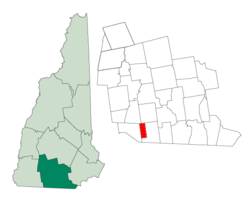Greenville, New Hampshire
| Greenville, New Hampshire | |
|---|---|
| Town | |

East Main Street in 1919
|
|
 Location in Hillsborough County, New Hampshire |
|
| Coordinates: 42°46′02″N 71°48′44″W / 42.76722°N 71.81222°WCoordinates: 42°46′02″N 71°48′44″W / 42.76722°N 71.81222°W | |
| Country | United States |
| State | New Hampshire |
| County | Hillsborough |
| Incorporated | 1872 |
| Government | |
| • Board of Selectmen | Carla C. Mary Douglas A. Reardon Steve Spratt |
| • Town Administrator | Kelley Collins |
| Area | |
| • Total | 6.9 sq mi (17.8 km2) |
| • Land | 6.9 sq mi (17.8 km2) |
| • Water | 0.0 sq mi (0.0 km2) |
| Elevation | 830 ft (253 m) |
| Population (2010) | |
| • Total | 2,105 |
| • Density | 310/sq mi (120/km2) |
| Time zone | Eastern (UTC-5) |
| • Summer (DST) | Eastern (UTC-4) |
| ZIP code | 03048 |
| Area code(s) | 603 |
| FIPS code | 33-31940 |
| GNIS feature ID | 0873613 |
| Website | www.greenvillenh.org |
Greenville is a town in Hillsborough County, New Hampshire, United States. The population was 2,105 at the 2010 census. It is located at the junction of New Hampshire routes 31, 45, and 123.
Once a part of Mason called Mason Village, Greenville is one of the state's newest and smallest towns, incorporated in 1872. It is located at the High Falls on the Souhegan River, whose plentiful water power provided the mill town with the state's first industries, making cotton and woolen goods. Because of the falls, Greenville was always a manufacturing center. The Columbian Manufacturing Company was established in 1826 to make textiles in both Greenville and New Ipswich. The Columbian is long gone, but its fine brick buildings still dominate the village, kept company by Queen Anne style houses on side streets. The mills are now used for other businesses and storage, and one has been converted into housing for the elderly.
Greenville once had a Boston & Maine Railroad trestle. Before it was dismantled for safety reasons, local residents turned out one sunny afternoon to watch Bronson Potter, Mason resident and inventor, fly a private airplane underneath the span on a wager. The railroad depot, which still stands, was once an important landmark that put the tiny towns of Mason and Greenville "on the map." It has since been turned into a Chinese restaurant and lounge.
...
Wikipedia
